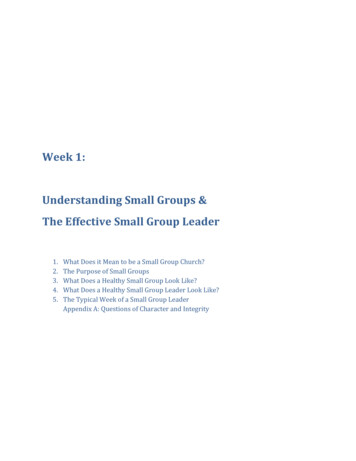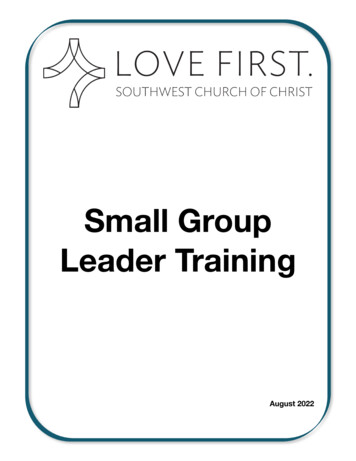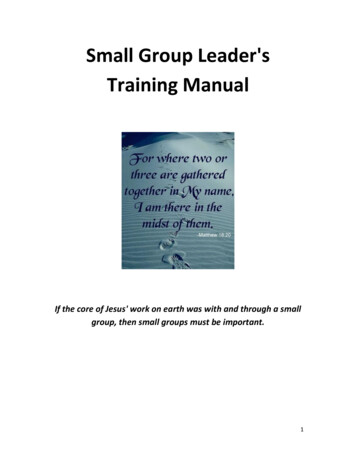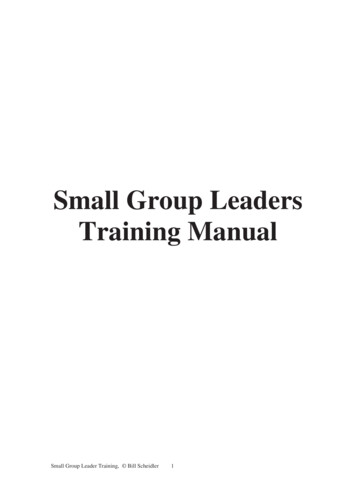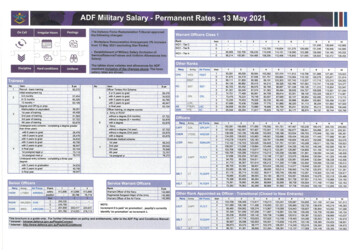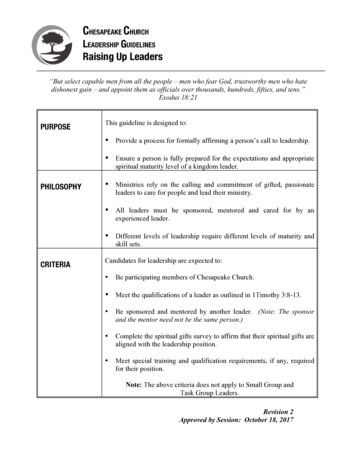
Transcription
Small Group LeaderTraining Guide
Small Group Leader Training GuideTable of ContentsVideo 1: The Role Of A Small Group Leader . 2Video 2: Ten Characteristics Of Great Leaders . 3Video 3: Nine Characteristics Of A Great Group . 5Video 4: How To Plan The Evening In Your Group . 7Video 5: Group Culture . 9Video 6: Seven Challenging Behaviors in the Group . 12Video 7: Pastoral Wisdom . 15Video 8: Pastoral Care Frameworks . 17APPENDIX . 19Small Group Ground Rules . 21Workbook Lessons Outline. 23Shepherding Verses. 25Email Sample: Connecting your Group . 27Scripture about Salvation . 29What To Do When Crisis Hits . 31When an Individual Talks About Suicide . 33Speaking at re engage . 35Sharing Life Maps: Instructions for Leaders . 371
Small Group Leader Training GuideVideo 1: The Role Of A Small Group LeaderThe primary role of a small group leader is to make disciples Matthew 28:19-20 While re engage is a marriage ministry, it is really a discipleship ministry Our greatest need is a relationship with Christ You are not providing marital therapy You are not running a support groupExpectations for re engage leaders Shepherd the group (Proverbs 27:23) Point your group to Christ Tend to your own walk with Christ Do the work with your spouse (active participants vs. passive gurus) Clarify the Gospel with each group member at some point (Scripture About Salvationin the appendix might be helpful) Have consistent attendance Have an ownership mentality – this is your ministry!Unhealthy reasons for serving Want to be noticed Desire to be needed Struggling in your own marriageWrap-up re engage is not fundamentally about couples having a better marriage It is about couples following Christ and, as a result, their marriage will improve It is not about you but about God! (Romans 1:9, 2 Timothy 1:3)2
Small Group Leader Training GuideVideo 2: Ten Characteristics Of Great Leaders1. Relational and Warm You’ve got to like people Have a host mentality Show genuine interest in meeting the needs of others2. Vibrant spiritual life and know and apply God’s Word Minister from an overflow of time with God Model a relationship with Christ Correctly use scripture and show couples how to apply it Use the Gospel and example of Christ to explain or call to action3. Humble Humility draws others in Colossians 3:124. Available Not just a weekly class Touch points throughout the week (e.g. calls, text, email, coffee, meal)5. Able to balance Truth and Grace Ephesians 4:15 Think of it like a velvet-covered brick Both truth teller and encourager3
Small Group Leader Training Guide6. Good listeners 80% listening, 20% talking Resist the urge to be profound7. Have a marriage worth imitating and are authentic about their struggles Share the full picture of your marriage Show how you move through struggles Vulnerability breeds connectedness 1 Corinthians 11:18. Can manage a group well Facilitate conversation, keep the pace moving Stay in control of the group Awareness of group dynamics9. Initiate rather than respond Take action God will use your initiative to bring about change10. Catalyst for change Partnering with God to bring about life changeWrap-up God is using you, His people, to do His work!4
Small Group Leader Training GuideVideo 3: Nine Characteristics Of A Great Group1. Reliance on God’s word more than personal opinions Scripture drives conversations / counsel given to couples Hebrews 4:12 Couples bring their Bibles Use Shepherding Verses in the appendix2. Safe Warm nurturing place No gossip Nothing shared outside the group except for physical, emotional or spiritual injury3. Authentic Atmosphere of openness Starts with the leader4. Everyone gets to share Success is couples talking about their marriage The group itself cares that everyone gets to share5. People focus on themselves Spouses are not blaming each other Physical reminders might help Be encouraged by "in my circle" language!5
Small Group Leader Training Guide6. Encouraging The group builds each other up Hebrews 10:25 Occurs outside group also7. Genuine care for each other Couples initiate contact with one another Fellowship takes place in between the meetings Friendships build They are praying for each other8. Conflicts within the group are resolved You WILL have conflict Great opportunity for both couples and the group to grow Check out the Conflict Field Guide at MarriageHelp.org/Conflict9. Everyone is engaged and working hard Couples are doing the lessons, even if they miss group time Couples are taking ownership of the group with things like housekeeping tasksWrap-up Don't forget to have fun Create an environment where truth can take root and life change can happen!6
Small Group Leader Training GuideVideo 4: How To Plan The Evening In Your GroupPrepare ahead of time with your spouse Do your lesson Discuss who will lead each part of the evening Identify the key questions to cover Pray for the group, by name Prior to the first week, contact your couplesFirst night Likely to be awkward Have each person introduce themselves Ice-breaker questions can be fun and useful to foster positive conversations Remind them you are facilitators whose role is to help the group stay focused Read the Small Group Ground Rules from the appendix Pass out workbooks and review the lesson format Note the link in each lesson to online resources If time allows, discuss take-aways from Large Group7
Small Group Leader Training GuideSubsequent nights Read the room Be flexible with your plan Open in prayer, perhaps with a focus on today’s lesson topic Follow-up from last week with any open items Ask about take-aways from Large Group Solicit observations or epiphanies about the lesson, but don't teach the lesson Cover the most important lesson questions, but don't go around the circle Build in time for prayer requests Allow uncomfortable silences No more than one conversation at a timeWhat if the leader couple cannot make it to group one week? Look for a strong couple in the group that could lead one week Substitute leaders are not a best practice If no one is capable of leading, the group comes to Large Group then goes out If one leader spouse can make it, proceed like a normal weekWhat if only half the group (or less) can attend a given night? Groups with struggling couples should meet, and re-cover the lesson next week Keep the couples moving forward through the lessonsWrap-up The outcome of your group is not dependent upon you! Deuteronomy 31:8 Trust Him8
Small Group Leader Training GuideVideo 5: Group CultureHave individuals speak for themselves primarily Primarily have a tone of working on themselves Questions to ask might be:o “What is your part?”o “What could you have done differently?”o “What did you contribute?"o “What do you need to ask forgiveness for?" Write the questions in your book if it helps You won't be perfect!Manage “Cross talk” Cross-talk: speaking into the issue of someone else Early on, either limit or eliminate cross talk to help people focus on themselves As the group matures you can relax the rulesDon’t assume any previous Bible knowledge Avoid churchy language If someone says something churchy, have it clarified If necessary, take extra time during group to help individuals find a passageNot all participants necessarily attend your church Avoid words / phrases culturally bound to your church9
Small Group Leader Training GuideDon’t take sides between two spouses Proverbs 18:17 Make sure to hear both stories before discussing the situationAffirm people for sharing When they share, thank them for sharing Don’t act shocked, or immediately start giving advice, or they will stop sharing Always assume there is more to the story, especially early in the group Use open-ended questions like "What other factors played into that situation?" Follow-up outside of group with more questions, if appropriateBe prepared for something very sensitive to be shared Either a crisis, or something that they have never shared with anyone before After someone shares could be the most important 30 seconds of their life Thank them for sharing and then ask how you can help If they are emotionally distraught and lacking direction you can help them by:o Reminding them of God's love for themo Reminding them that the group cares for themo Helping them think through the next 24 hours Pray for them that night, with the group Follow up within 24 hours Review What To Do When Crisis Hits in the appendix Review When An Individual Talks About Suicide in the appendix10
Small Group Leader Training GuideAsk good follow up questions Proverbs 20:5 Should always be open-ended, such aso “What does that look like in your own marriage?”o “What do you think your spouse would say about the issue?”o “What does God’s Word say about that?”o “What do you think God wants you to do?”o “Where do you think God was in that?”Create Community Goal is to create a sense of biblical community Hebrews 10:24-25 Move the group towards community, but do not force it; be patient Plan group time outside the weekly meetingo A dinner and game night, informal coffees, dessert night, picnics, etc. Plan one-on-one time with spouses (guys with guys, gals with gals)o Phone calls, coffee, lunch, breakfast, etc. Group emails and texts also keep folks engaged (see Email Sample in appendix)Lack of commitment must be addressed For example, not doing homework, or not attending, or disengaged during group Address outside group Assume the best about the person Remind them they are cheating themselves, their spouse, and the groupWrap-up You are part of God’s “Plan A” in the lives of the people in your group! Constantly try to improve your ability to shepherd your group11
Small Group Leader Training GuideVideo 6: Seven Challenging Behaviors in the Group1. The excessive talker Symptom: Tends to dominate the group by talking too much Stay in control of your group: your group is looking to you for leadership Thank them for sharing; remind them that the group needs to hear from everyone Example: "You have added a lot tonight. Let’s make sure we hear from everyone." Be very directAlways address these behaviors in a Christ-like manner If the issues are not severe:o Make a general statement to the group at the start of next week's groupo Lets the group know that you were aware of the issue and are addressing it If the issues are significant:o Address privately outside of groupo Affirm themo Ask for their help and permission to address them if their conduct re-occurs2. The rambler Symptom: Talks in circles or cannot keep their comments brief Don't be afraid to cut a Rambler off – you can cut them off without shaming themo Stop themo Paraphrase what you think they are saying ("What I heard you say was ")o Address that issue If the problem persists, ask them to think through some of their answers ahead oftime and how they could answer succinctly.12
Small Group Leader Training Guide3. The mute Symptom: Does not speak in the group, and often appears deathly afraid to do so Address this outside of group to see if there is a reason they might not be sharing Ask them if it would be OK for them to start the group time next week with one ofthe questions they feel comfortable answering4. The spouse interrupter Symptom: Shares their side of the story while the spouse is sharing Ask them to let their spouse finish. If it is a pattern then you want to address it Watch for non-verbal interruptions also5. The surface level talker Symptom: Talks a lot but won't actually reveal much Guide them to be more specific, asking follow up questions such as:o "Why do you think or feel that way?"o "What are the real issues?" If someone says something like "I struggle with anger", a great follow-up question is:o "What does that look like in your marriage?"6. The "Me Too" member Symptom: Frequently follows the comments of another person by saying "Me Too!" People typically do this for one of two reasons:o Prideful response to bring attention to themselveso Another way to not reveal much about themselves Identifying with someone is helpful occasionally but reveals a focus on self if ithappens continually if you see someone nodding or agreeing, ask them "I'd love to hear your thoughts"13
Small Group Leader Training Guide7. The Venter Symptom: Shares in an angry tone or becomes angry Hurting people say hurtful things As they share stop themo Help them de-escalate by talking in a quiet/calm tone In extreme cases, take the Venter outside of group to help them calm downo Remind them of a verse like Proverbs 15:1o Remind them it is best for themselves and also easier for their spouseto receive if they are not angryWrap-up Couples might shut down when these things are not addressed; this matters Help the group see that each individual plays a part in the health of the group14
Small Group Leader Training GuideVideo 7: Pastoral WisdomYou are part of a royal priesthood 1 Peter 2:9 You have a responsibility to shepherd those in your careBe available but not overly so You cannot sacrifice yourself, your marriage or your family to care for others Being overly available may not be good for the coupleo They can start to see you as the answer to their problems, not Christo Sometimes praying with them and seeing them next week will force them towork on the issues themselves If a crisis hits, a meeting outside of the regular time can be:o Incredibly helpful for the coupleo A great way to disciple the rest of the group by not consuming group timeo Uncomfortable, so lean hard on Christ for patience and wisdom Outside meetings can be on your scheduleThe role of Scripture 2 Timothy 3:16 Anchor answers and advice in scripture It's OK to say "I don't know" and come back next week with relevant passages Ask individuals which Scriptures informed their comments Give the group an assignment to look up passages related to a given issue See Shepherding Verses in the appendix June Hunt’s Counseling Through Your Bible Handbook is very helpful15
Small Group Leader Training GuideYour own marriage Do the homework yourselves each week Continue investing in your own marriage Share the successes and failures of your marriage with the group Consider sharing your testimony early ono Use the Life Maps or Speaking at re engage formats in the appendix Modeling healthy interactions between a husband and wife Maintain a high level of engagement; this sets the tone of the group No one should dominate and no one should be checked out Debrief your performance as a team If you are struggling in your own marriage, let leadership knowOpposite Sex relationships Never counsel someone alone of the opposite sex, in any medium Be alert for any connections between group members of the opposite sexWhen you should involve re engage leadership You are trusted, so filling in leadership with every detail of your group isunnecessary 2 Peter 1:3 The goal is to help you succeed and grow as a leader Feel free to ask for help on a situation at any point If possible, avoid waiting until an issue blows up before contacting leadership You have not failed if you need to contact leadership! Inform leadership when there has been:o Physical abuse, separation, outbursts of anger, threats of suicide, unresolvedconflict in the groupWrap-up John 15:5 Your dependence on God is your greatest asset!16
Small Group Leader Training GuideVideo 8: Pastoral Care FrameworksThe purpose of frameworks Impossible to equip you for all situations Frameworks provide you a grid through which to process a situationThe 4 C's Or, the 4 Characteristics Of Couples That Get Well There are 4 things common to couples who see healing in their marriage Use this framework to determine where a couple needs improvement These 4 characteristics are not actions but they are decisions that will lead to action #1: Christo They experience a new vitality in their walk with Christo John 15 – Abide in the Lordo 1 Corinthians 10:31 – Do everything for the glory of God #2: Circleo Drawing a circle around yourself and working on everything in the circleo They see themselves (not their spouse) as their biggest marriage problemo Matthew 7:3-5 – Get the log out of your own eye #3: Commitmento They ruthlessly commit to their marriageo All doors of escape are closed and lockedo Matthew 19:6 – It is God who joins together #4: Communityo They have an active community around them and are fully known by otherso They are connected to others in relationship, not isolated.o Hebrews 10:24 – Spur one another on toward love and good deedso Life change happens best in the context of community17
Small Group Leader Training GuideThe 5:14 Principle This is an application of 1 Thessalonians 5:14, which says "And we urge you,brothers, admonish the idle, encourage the fainthearted, help the weak, be patientwith them all." Use this framework to know how best to speak with a couple This verse is talking about 4 different people, and how you should relate to them The Idleo Sometimes translated "lazy" or "unruly"o They know the truth but refuse to follow ito They need an admonition or truth spoken clearly and boldly The Faintheartedo Sometimes translated "timid"o They know what to do and are actually doing ito They need your encouragement to keep going The Weako Sometimes translated "immature"o This is often a new or struggling believero They need you to spend time with them and help build their understanding Be Patient With Allo Don't fret if a couple is not moving forwardo God is the one who will change their hearto There are periods of time when it is appropriate to put in extra effort to helpa couple; if it becomes the norm then reassess your approacho Grace Truth Time ChangeWrap-up 2 Timothy 2:15 – Approved Worker Philippians 2:13 – if a person has the desire to change, that came from God, and if aperson has the ability and does change that came from God also 1 Corinthians 3:6 – our job is to plant and water, growth is God’s job When things don't go well, remember that faithfulness is your job and change isGod’s When things go well, stay humble and remember that you simply watered andplanted but God brought the growth!18
Small Group Leader Training GuideAPPENDIX19
Small Group Leader Training Guide[This page intentionally left blank]20
Small Group Leader Training GuideSmall Group Ground RulesThe following characteristics will contribute to a safe and successful re engage small groupexperience for couples.1. Successful small groups have a balance of each person getting to contribute andshare without any one person or couple dominating the group’s time and attention.So, don’t talk too little and don’t talk too much.2. Avoid the temptation to try to fix one another. Safe and successful small groups arecharacterized by support rather than advice-giving. Trying to “fix” someone else isusually a sign that we don’t want to deal with our own stuff.3. Even though you are at re engage as a couple, focus on your own individualthoughts and feelings as you share with the group. Please don’t use your sharing asan opportunity to harm someone else.4. Scripture calls us to refrain from gossip. Please operate under the direction of God’sWord in the handling of information shared within the group. In order to provide asafe environment for your group, you must commit not to share information aboutone another outside the group except in the event of the threat of physical,emotional, or spiritual injury and then only under the guidance of a re engageleader.5. In re engage, each person should be allowed to share without interruptions.However, like most other successful conversations, others are free to contributewith comments or observations only to the extent that it is helpful for the person orcouple that is sharing.21
Small Group Leader Training Guide[This page intentionally left blank]22
Small Group Leader Training GuideWorkbook Lessons OutlineRECOGNIZE your inability to love.1. LoveMain idea: God’s standard of love is the way He loves. 1 Cor. 13:4-7 defines love biblically. Youcannot meet this standard.2. BrokennessMain idea: Your marriage is broken because it is made up of two broken people. You fall short ofGod’s standard.EMBRACE humility.3. GraceMain idea: You are in need of God’s grace.4. HumilityMain idea: Follow the example of Christ until you love yourself less than you love your spouse. Youcannot be a godly spouse if you are focusing on yourself.EXTEND grace and forgiveness.5. ForgivenessMain idea: You have been forgiven everything by God’s grace; therefore, you are able to forgive yourspouse.6. Forgiveness in ActionMain idea: Forgiveness in action is a practical guide to ask for and extend forgiveness.NURTURE truth.7. CommitmentMain idea: God’s covenantal love provides an example of the way you are to love your spouse.Marriage is a commitment, not a contract.8. TruthMain idea: You are tempted every day to believe the lies all around you regarding your marriage.You need to identify the lies you are choosing to believe and replace those lies with biblical truth.23
Small Group Leader Training GuideGIVE yourself away.9. CommunicationMain idea: The goal of communication is mutual understanding. You have negative communicationpatterns that you need to identify and change.10. ConflictMain idea: Conflict in marriage is normal and a great opportunity to glorify God, grow yourself andgrow your spouse. Handling conflict biblically is a great path to oneness.ADORE and respect.11. ExpectationsMain idea: You have many expectations about your spouse and your marriage that, if unmet andhandled incorrectly, will lead to disappointment and anger. You need to be able to articulate anddeal with unmet expectations and realize that God is your only true hope.12. UnderstandMain idea: God calls you to live with your spouse in “an understanding way.” This means you willneed to become a student of your spouse so that you can best love and celebrate them. Yourrelationship with your spouse is also tied to your relationship with God.GROW in intimacy.13. Emotional IntimacyMain idea: Intimacy is to “fully know and be known, without the fear of rejection.” Being fullyknown and accepted by God allows you to be authentic with your spouse.14. Sexual IntimacyMain idea: Sex is God’s gift in marriage to experience a unique physical expression of oneness andintimacy.EMBRACE oneness.15. CompletionMain idea: Part of God’s design in marriage is to use your spouse to conform you into His image.You need to allow your spouse to partner with you in spiritual growth.16. DiligenceMain idea: This is a way to live, not a program that you go through. You don’t graduate fromthis. Success in marriage is not just avoiding divorce, but always moving toward oneness.You will have to fight for everything you have learned.24
Small Group Leader Training GuideShepherding VersesABORTIONExodus 1:17, 20-21Deuteronomy 5:172 Samuel 12:23Psalm 127:3Psalm 113:9Psalm 139:13-16Isaiah 40:31Matthew 6:33AFFECTION NEEDSGod loves you.Psalm 63:3; 86:13; 100:5Psalm 145:8-9John 3:16Romans 5:8; 8:38-39I John 3:1; 4:7-10I John 4:16, 18-19ALCOHOLProverbs 28:13; 29:25I John 1:8-9Jeremiah 2:19John 4:10; 8:36Acts 1:8Galatians 5:1, 22-23Philippians 3:12-14Psalm 103:12Isaiah 40:31Romans 8:31-37ANGERHostilityPsalm 103Ephesians 1:13-14ANXIETYPsalm 121Acts 27I Peter 5:7Matthew 6:24-34Philippians 4:6BACKSLIDINGIsaiah 55:7Hosea 14:4Revelation 2:4-5I John 1:9Hebrews 7:25John 3:17I Corinthians 3:3Proverbs 14:14DISCIPLINE OF CHILDRENDeuteronomy 6:5-7Proverbs 22:6; 19:18;13:24; 22:15Ephesians 6:4I Timothy 3:4Titus 2:4BITTERNESSHebrews 12:14-15Ephesians 4:31-32I Peter 2:23Matthew 6:14-15Romans 12:14-21DISCIPLINE2 Corinthians 12:7-10Hebrews 12:5-11CHILD ABUSEI Corinthians 9:25-27Philippians 4:4-9, 13Hebrews 1:14Romans 12:2James 4:7Romans 6CULTSPsalm 119:104Mark 13:21-232 Corinthians 11:13-15COVETINGExodus 20:17I Corinthians 12:31; 14:39DEATHJohn 14:1-3I Corinthians 13:12John 11:25Philippians 1:21I Kings 14:1, 132 Samuel 12:22-23DEPRESSIONPsalm 27Psalm 40:1-3Psalm 121Acts 27Ephesians 1:13-1425DIVORCEMalachi 2:16Matthew 19:1-11Matthew 5:31-32I Corinthians 7:10-16I John 1:9DRUGSI Corinthians 6:12Ephesians 5:18Luke 4:18-21, 36Colossians 2:15I John 3:8Galatians 5:1, 13ENDURANCEPsalm 40:1-3John 11Acts 272 Corinthians 12:7-10Hebrews 12:5-11ENEMIESExodus 23:4-5Proverbs 24:17-18Luke 6:27-37Romans 12:14, 19-21ENVY-JEALOUSYProverbs 14:30I Corinthians 3:3Galatians 5:19-21James 3:14-16
Small Group Leader Training GuideFEARPhilippians 4:4-9Psalm 103Psalm 121Acts 27FORGIVENESSPsalm 32; 103I John 1:9I Peter 1:18-19I Peter 2:24Hebrews 9:22FINANCESMatthew 6:33Malachi 3:8-10Philippians 4:18-19GOSSIP2 Corinthians 12:20Leviticus 19:16I Timothy 5:13Luke 3James 4:11-12Matthew 18:15GOD'S LOVE &ACCEPTANCEPsalm 27Psalm 103Luke 15Acts 27GUILTPsalm 32Psalm 103Luke 15HOMOSEXUALITYLeviticus 20:13I Corinthians 6:9I Timothy 1:10Romans 1:21, 26-27Romans 6:11-14, 22HOPELESSNESS &DESPAIRPsalm 27Psalm 40:1-3Psalm 103Psalm 121John 11Acts 27HOPEPsalm 27Psalm 40:1-3Psalm 119Psalm 121Acts 27HUMILITYJohn 13:1-17Ephesians 5:15-21JUDGMENTALMatthew 7:1-2John 8:7Mark 11:24-25Luke 6:41Romans 14:4Ephesians 6:1LONELINESSPsalm 121Luke 15John 11Acts 27Ephesians 1:13-14TEMPTATIONI Corinthians 10 :13James 1:2-3, 12Romans 8:28I Thessalonians 5:18MARRIAGERestoring Lost Love:Revelation 2:1-16Husbands:Ephesians 5:15-6:2026I Peter 3:7-9WivesEphesians 5:15-6:20I Peter 3:1-6MENTAL ILLNESS2 Timothy 1:7Isaiah 26:3Philippians 4:8Luke 4:18-19Romans 12:2OCCULTExodus 22:18Leviticus 19:31Leviticus 20:6, 27Deuteronomy 18:10-122 Kings 21:62 Chronicles 33:6Isaiah 47:9, 13-15Acts 19:17-20PEACEPsalm 40:1-3Psalm 119Psalm 121John 11SELF-IMAGELuke 15Ephesians 1:13-14SUICIDEPsalm 8, 40Psalm 42, 43John 10:10Romans 15:4Philippians 4:6-8Psalm 73Philippians 4:19Matthew 6:25-33Hebrews 7:25
Small Group Leader TrainingEmail Sample: Connecting your GroupThe following emails are samples of how re engage leaders David and Denise Renken reachout to their group each week.Email #1Lesson 15 - While I was reading in Hebrews this morning my thoughts went to our Re Engage group.Hebrews 12:1 Let us throw off everything that hinders and the sin that so easily entangles, and let us runwith perseverance the race marked out for us. Consider Him who endured such opposition from sinful men,so that you will not grow weary and lose heart.With so many metaphors on racing I wonder if Paul had been a track star of this era? Be that as it may, thecomparison is perfect; each of us has a plan that God has laid out for us that only we can carry out. Similar to aracecourse, our path is set up in advance and our lane is assigned. My encouragement to you all is that wefinish strong in this group and realize that the course (our life) is still before us.This week the main principle is Embracing Oneness; with the focus on how a spouse completes, or helps eachother on their road to sanctification (to be more Christ-like)Earlier in our lives, too often I took the Complete and turned it into another C word, Competition. This tookseveral forms but all served to tear down instead of building up; correcting her stories (my memory wasperfect), talking about how my salary (versus our income) was growing, commenting on a project she hadfinished with how my way would have been better, just to name a few examples. In our early years together,Denise struggled with not admonishing (in love and humility) and taking control (pride/leading) versus beingpatient. Over time, the Holy Spirit changed this. Just an FYI – I did check with Denise to get her thoughts.This week’s lesson has an excellent outline on page 2 of Lesson 15 ways in which in which we can completeour spouses (summary of 1 Thes 5:14). This is also the crux of question 2. We will be looking at questions 1-3this week, and if any couples would like to share anything on 4 and 5. Please remember
Small Group Leader Training Guide 2 Video 1: The Role Of A Small Group Leader The primary role of a small group leader is to make disciples Matthew 28:19-20 While re engage is a marriage ministry, it is really a discipleship ministry Our greatest need is a relationship with Christ
